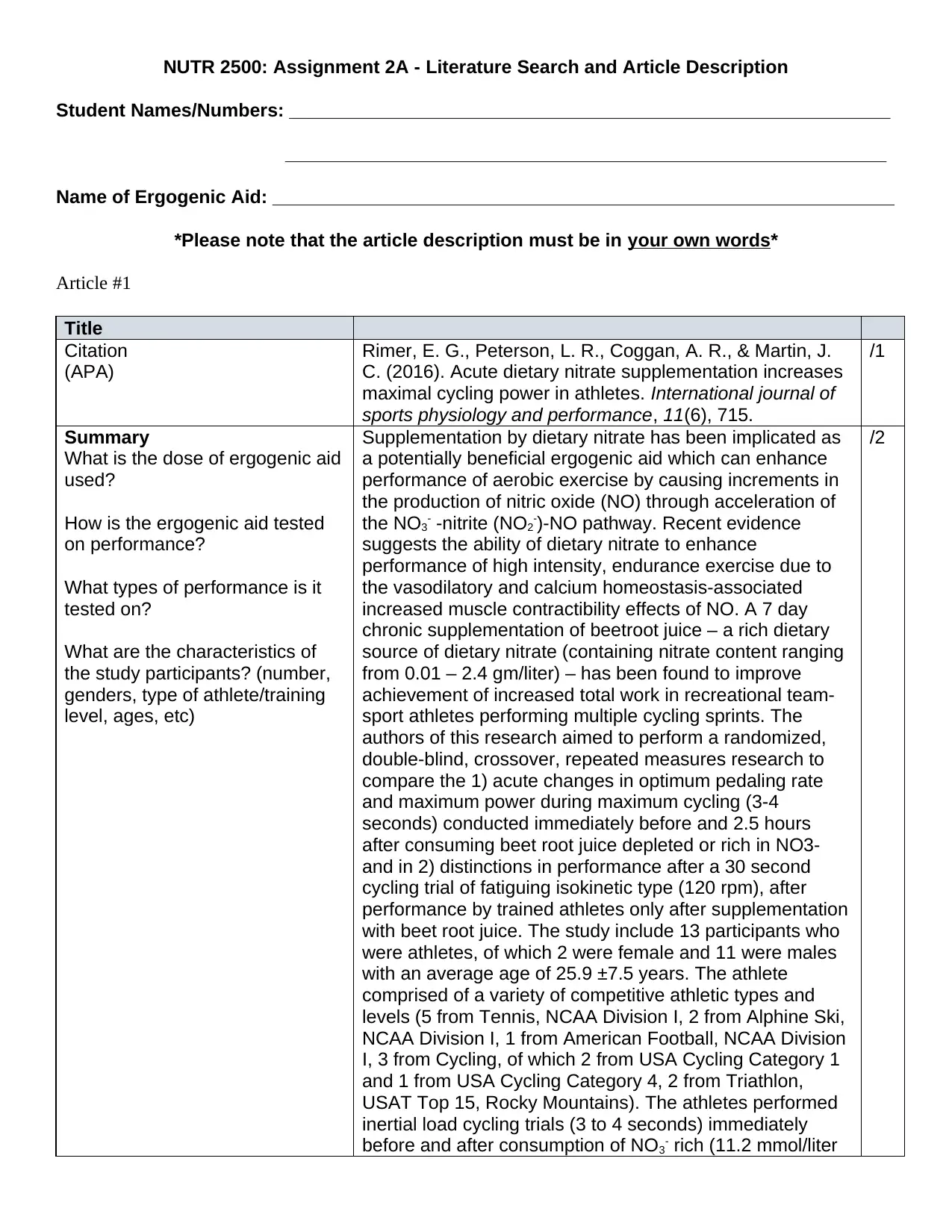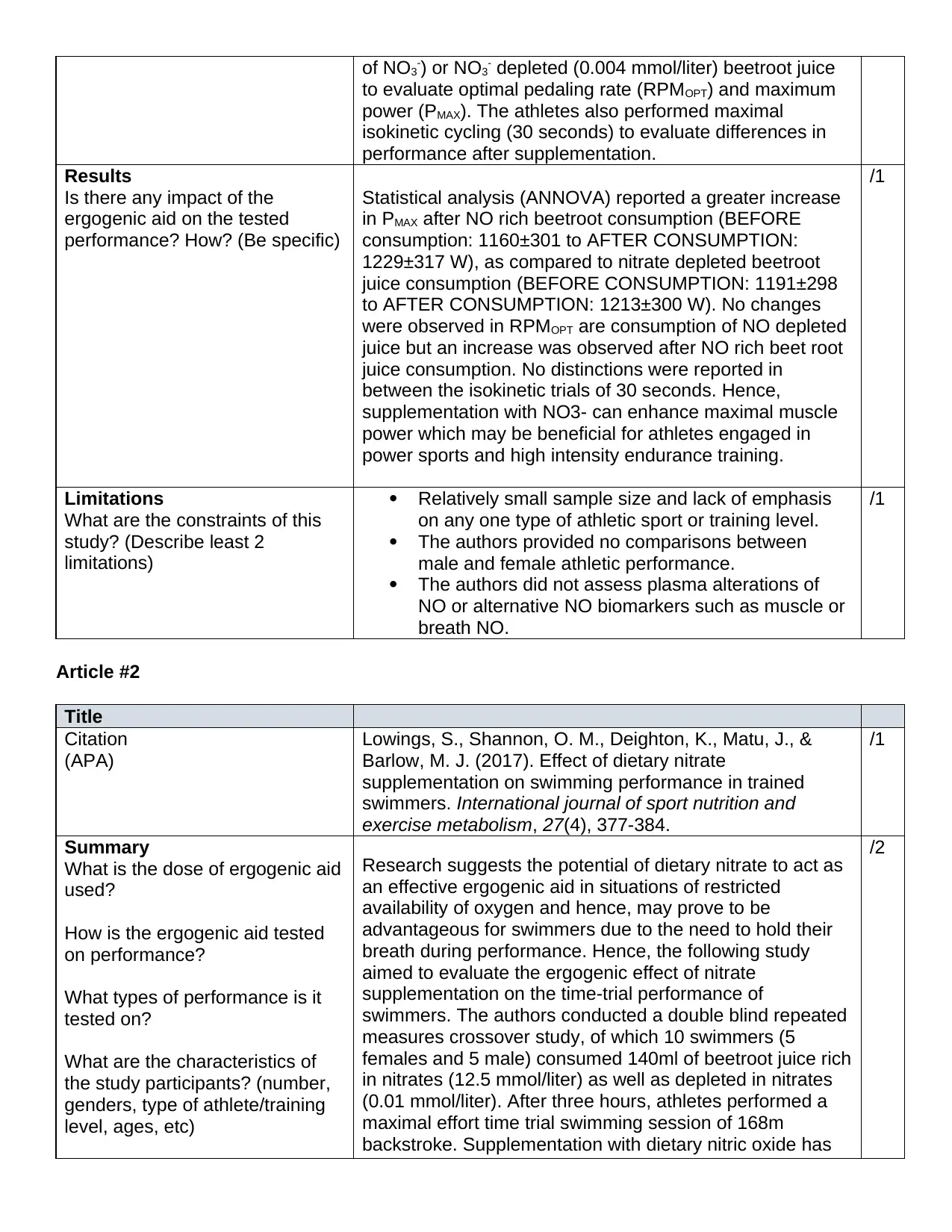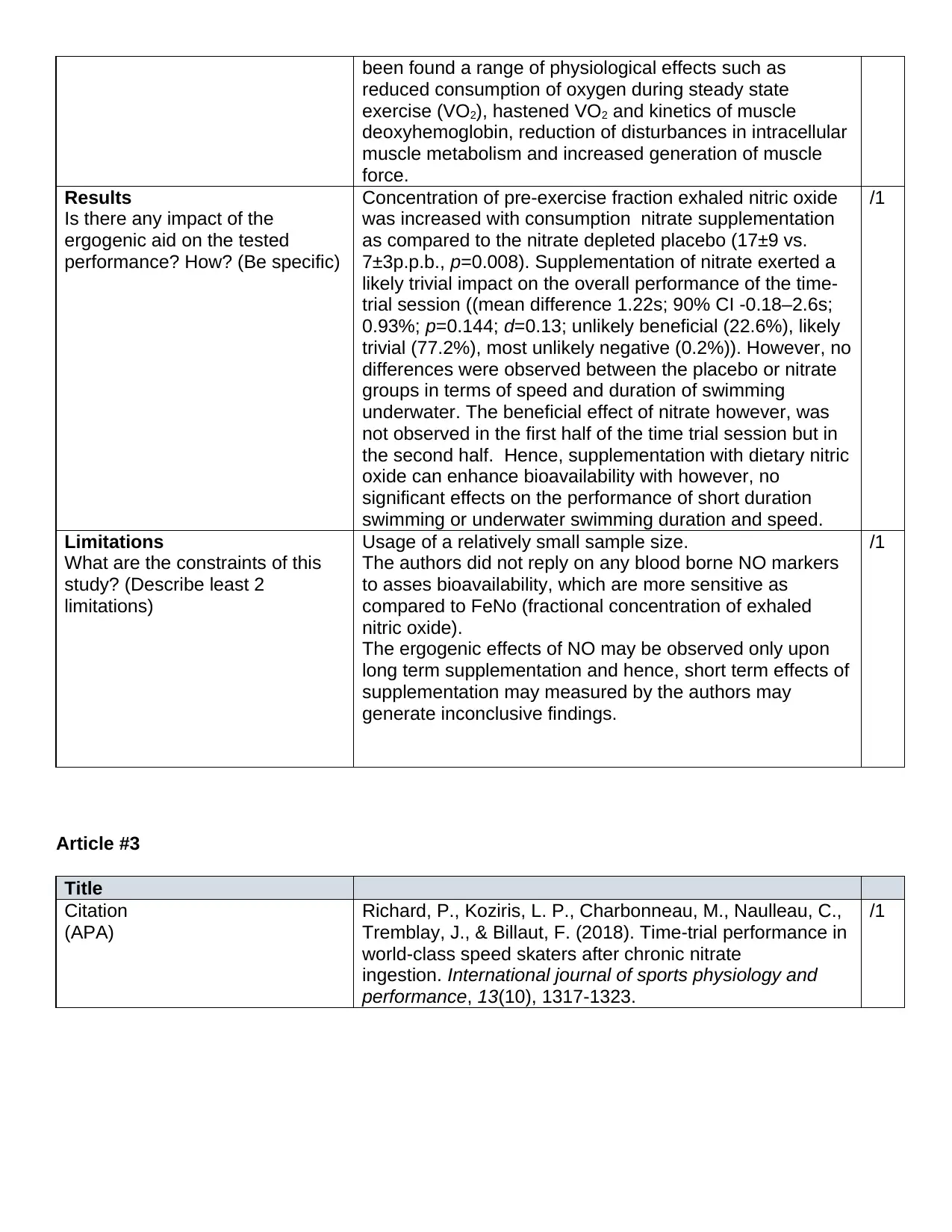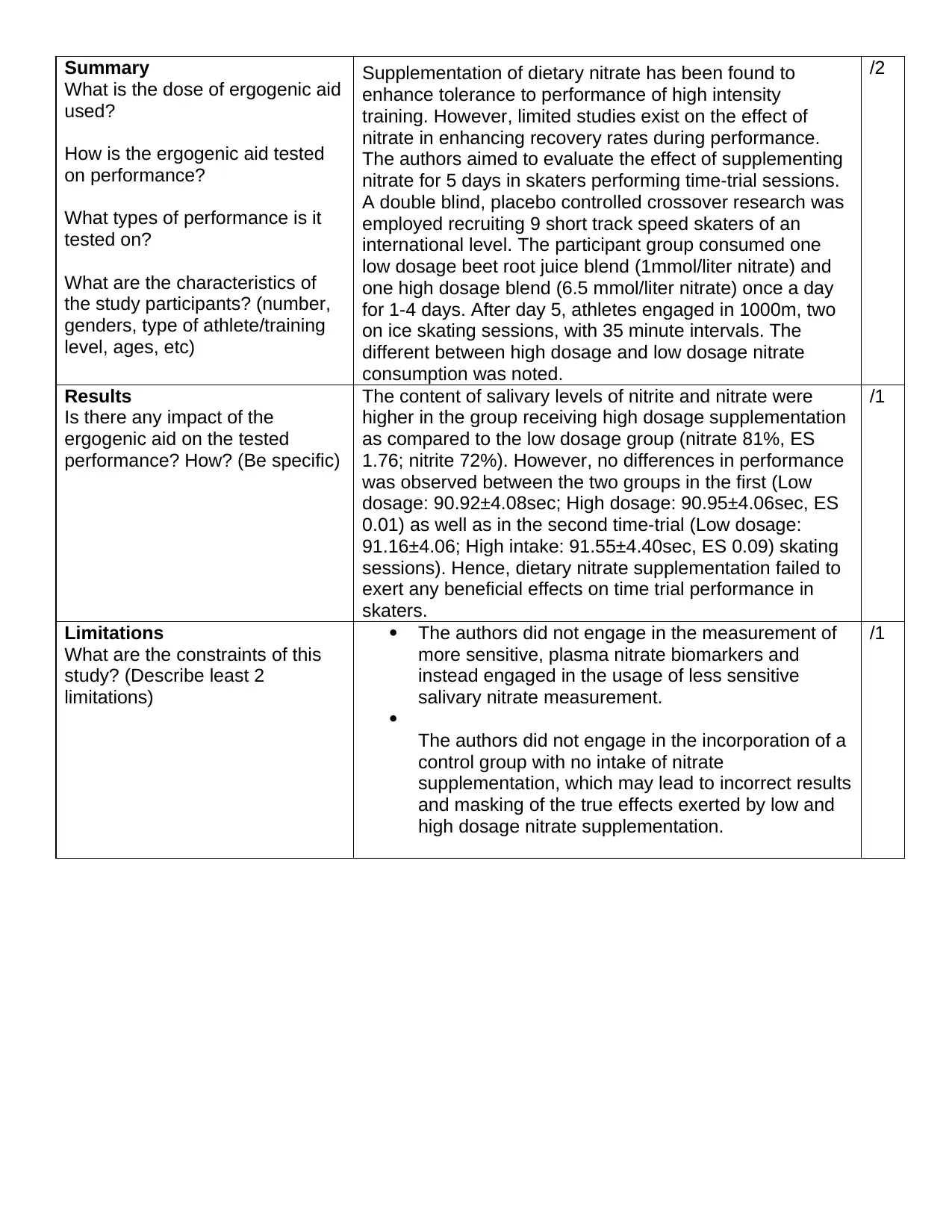NUTR 2500: Assignment 2A - Literature Search & Article Descriptions
VerifiedAdded on 2023/04/23
|4
|1764
|284
Homework Assignment
AI Summary
This assignment, part of the NUTR 2500 course, requires a literature search and article descriptions focusing on ergogenic aids, specifically dietary nitrate. The student analyzed three research articles, summarizing each article's methodology, including the dose of the ergogenic aid, how performance was tested, the characteristics of the study participants, the results, and the limitations of each study. The first article investigated the effects of beetroot juice supplementation on maximal cycling power, the second assessed the impact of dietary nitrate on swimming performance in trained swimmers, and the third examined the effects of nitrate supplementation on time-trial performance in speed skaters. The student's summaries highlight the varying effects of nitrate supplementation across different athletic disciplines and identify the constraints of each study, such as small sample sizes and the lack of specific biomarker measurements. The assignment emphasizes the importance of critical analysis of scientific literature and the ability to synthesize information to understand the impact of ergogenic aids on athletic performance.

NUTR 2500: Assignment 2A - Literature Search and Article Description
Student Names/Numbers: __________________________________________________________
__________________________________________________________
Name of Ergogenic Aid: ____________________________________________________________
*Please note that the article description must be in your own words*
Article #1
Title
Citation
(APA)
Rimer, E. G., Peterson, L. R., Coggan, A. R., & Martin, J.
C. (2016). Acute dietary nitrate supplementation increases
maximal cycling power in athletes. International journal of
sports physiology and performance, 11(6), 715.
/1
Summary
What is the dose of ergogenic aid
used?
How is the ergogenic aid tested
on performance?
What types of performance is it
tested on?
What are the characteristics of
the study participants? (number,
genders, type of athlete/training
level, ages, etc)
Supplementation by dietary nitrate has been implicated as
a potentially beneficial ergogenic aid which can enhance
performance of aerobic exercise by causing increments in
the production of nitric oxide (NO) through acceleration of
the NO3- -nitrite (NO2-)-NO pathway. Recent evidence
suggests the ability of dietary nitrate to enhance
performance of high intensity, endurance exercise due to
the vasodilatory and calcium homeostasis-associated
increased muscle contractibility effects of NO. A 7 day
chronic supplementation of beetroot juice – a rich dietary
source of dietary nitrate (containing nitrate content ranging
from 0.01 – 2.4 gm/liter) – has been found to improve
achievement of increased total work in recreational team-
sport athletes performing multiple cycling sprints. The
authors of this research aimed to perform a randomized,
double-blind, crossover, repeated measures research to
compare the 1) acute changes in optimum pedaling rate
and maximum power during maximum cycling (3-4
seconds) conducted immediately before and 2.5 hours
after consuming beet root juice depleted or rich in NO3-
and in 2) distinctions in performance after a 30 second
cycling trial of fatiguing isokinetic type (120 rpm), after
performance by trained athletes only after supplementation
with beet root juice. The study include 13 participants who
were athletes, of which 2 were female and 11 were males
with an average age of 25.9 ±7.5 years. The athlete
comprised of a variety of competitive athletic types and
levels (5 from Tennis, NCAA Division I, 2 from Alphine Ski,
NCAA Division I, 1 from American Football, NCAA Division
I, 3 from Cycling, of which 2 from USA Cycling Category 1
and 1 from USA Cycling Category 4, 2 from Triathlon,
USAT Top 15, Rocky Mountains). The athletes performed
inertial load cycling trials (3 to 4 seconds) immediately
before and after consumption of NO3- rich (11.2 mmol/liter
/2
Student Names/Numbers: __________________________________________________________
__________________________________________________________
Name of Ergogenic Aid: ____________________________________________________________
*Please note that the article description must be in your own words*
Article #1
Title
Citation
(APA)
Rimer, E. G., Peterson, L. R., Coggan, A. R., & Martin, J.
C. (2016). Acute dietary nitrate supplementation increases
maximal cycling power in athletes. International journal of
sports physiology and performance, 11(6), 715.
/1
Summary
What is the dose of ergogenic aid
used?
How is the ergogenic aid tested
on performance?
What types of performance is it
tested on?
What are the characteristics of
the study participants? (number,
genders, type of athlete/training
level, ages, etc)
Supplementation by dietary nitrate has been implicated as
a potentially beneficial ergogenic aid which can enhance
performance of aerobic exercise by causing increments in
the production of nitric oxide (NO) through acceleration of
the NO3- -nitrite (NO2-)-NO pathway. Recent evidence
suggests the ability of dietary nitrate to enhance
performance of high intensity, endurance exercise due to
the vasodilatory and calcium homeostasis-associated
increased muscle contractibility effects of NO. A 7 day
chronic supplementation of beetroot juice – a rich dietary
source of dietary nitrate (containing nitrate content ranging
from 0.01 – 2.4 gm/liter) – has been found to improve
achievement of increased total work in recreational team-
sport athletes performing multiple cycling sprints. The
authors of this research aimed to perform a randomized,
double-blind, crossover, repeated measures research to
compare the 1) acute changes in optimum pedaling rate
and maximum power during maximum cycling (3-4
seconds) conducted immediately before and 2.5 hours
after consuming beet root juice depleted or rich in NO3-
and in 2) distinctions in performance after a 30 second
cycling trial of fatiguing isokinetic type (120 rpm), after
performance by trained athletes only after supplementation
with beet root juice. The study include 13 participants who
were athletes, of which 2 were female and 11 were males
with an average age of 25.9 ±7.5 years. The athlete
comprised of a variety of competitive athletic types and
levels (5 from Tennis, NCAA Division I, 2 from Alphine Ski,
NCAA Division I, 1 from American Football, NCAA Division
I, 3 from Cycling, of which 2 from USA Cycling Category 1
and 1 from USA Cycling Category 4, 2 from Triathlon,
USAT Top 15, Rocky Mountains). The athletes performed
inertial load cycling trials (3 to 4 seconds) immediately
before and after consumption of NO3- rich (11.2 mmol/liter
/2
Paraphrase This Document
Need a fresh take? Get an instant paraphrase of this document with our AI Paraphraser

of NO3-) or NO3- depleted (0.004 mmol/liter) beetroot juice
to evaluate optimal pedaling rate (RPMOPT) and maximum
power (PMAX). The athletes also performed maximal
isokinetic cycling (30 seconds) to evaluate differences in
performance after supplementation.
Results
Is there any impact of the
ergogenic aid on the tested
performance? How? (Be specific)
Statistical analysis (ANNOVA) reported a greater increase
in PMAX after NO rich beetroot consumption (BEFORE
consumption: 1160±301 to AFTER CONSUMPTION:
1229±317 W), as compared to nitrate depleted beetroot
juice consumption (BEFORE CONSUMPTION: 1191±298
to AFTER CONSUMPTION: 1213±300 W). No changes
were observed in RPMOPT are consumption of NO depleted
juice but an increase was observed after NO rich beet root
juice consumption. No distinctions were reported in
between the isokinetic trials of 30 seconds. Hence,
supplementation with NO3- can enhance maximal muscle
power which may be beneficial for athletes engaged in
power sports and high intensity endurance training.
/1
Limitations
What are the constraints of this
study? (Describe least 2
limitations)
Relatively small sample size and lack of emphasis
on any one type of athletic sport or training level.
The authors provided no comparisons between
male and female athletic performance.
The authors did not assess plasma alterations of
NO or alternative NO biomarkers such as muscle or
breath NO.
/1
Article #2
Title
Citation
(APA)
Lowings, S., Shannon, O. M., Deighton, K., Matu, J., &
Barlow, M. J. (2017). Effect of dietary nitrate
supplementation on swimming performance in trained
swimmers. International journal of sport nutrition and
exercise metabolism, 27(4), 377-384.
/1
Summary
What is the dose of ergogenic aid
used?
How is the ergogenic aid tested
on performance?
What types of performance is it
tested on?
What are the characteristics of
the study participants? (number,
genders, type of athlete/training
level, ages, etc)
Research suggests the potential of dietary nitrate to act as
an effective ergogenic aid in situations of restricted
availability of oxygen and hence, may prove to be
advantageous for swimmers due to the need to hold their
breath during performance. Hence, the following study
aimed to evaluate the ergogenic effect of nitrate
supplementation on the time-trial performance of
swimmers. The authors conducted a double blind repeated
measures crossover study, of which 10 swimmers (5
females and 5 male) consumed 140ml of beetroot juice rich
in nitrates (12.5 mmol/liter) as well as depleted in nitrates
(0.01 mmol/liter). After three hours, athletes performed a
maximal effort time trial swimming session of 168m
backstroke. Supplementation with dietary nitric oxide has
/2
to evaluate optimal pedaling rate (RPMOPT) and maximum
power (PMAX). The athletes also performed maximal
isokinetic cycling (30 seconds) to evaluate differences in
performance after supplementation.
Results
Is there any impact of the
ergogenic aid on the tested
performance? How? (Be specific)
Statistical analysis (ANNOVA) reported a greater increase
in PMAX after NO rich beetroot consumption (BEFORE
consumption: 1160±301 to AFTER CONSUMPTION:
1229±317 W), as compared to nitrate depleted beetroot
juice consumption (BEFORE CONSUMPTION: 1191±298
to AFTER CONSUMPTION: 1213±300 W). No changes
were observed in RPMOPT are consumption of NO depleted
juice but an increase was observed after NO rich beet root
juice consumption. No distinctions were reported in
between the isokinetic trials of 30 seconds. Hence,
supplementation with NO3- can enhance maximal muscle
power which may be beneficial for athletes engaged in
power sports and high intensity endurance training.
/1
Limitations
What are the constraints of this
study? (Describe least 2
limitations)
Relatively small sample size and lack of emphasis
on any one type of athletic sport or training level.
The authors provided no comparisons between
male and female athletic performance.
The authors did not assess plasma alterations of
NO or alternative NO biomarkers such as muscle or
breath NO.
/1
Article #2
Title
Citation
(APA)
Lowings, S., Shannon, O. M., Deighton, K., Matu, J., &
Barlow, M. J. (2017). Effect of dietary nitrate
supplementation on swimming performance in trained
swimmers. International journal of sport nutrition and
exercise metabolism, 27(4), 377-384.
/1
Summary
What is the dose of ergogenic aid
used?
How is the ergogenic aid tested
on performance?
What types of performance is it
tested on?
What are the characteristics of
the study participants? (number,
genders, type of athlete/training
level, ages, etc)
Research suggests the potential of dietary nitrate to act as
an effective ergogenic aid in situations of restricted
availability of oxygen and hence, may prove to be
advantageous for swimmers due to the need to hold their
breath during performance. Hence, the following study
aimed to evaluate the ergogenic effect of nitrate
supplementation on the time-trial performance of
swimmers. The authors conducted a double blind repeated
measures crossover study, of which 10 swimmers (5
females and 5 male) consumed 140ml of beetroot juice rich
in nitrates (12.5 mmol/liter) as well as depleted in nitrates
(0.01 mmol/liter). After three hours, athletes performed a
maximal effort time trial swimming session of 168m
backstroke. Supplementation with dietary nitric oxide has
/2

been found a range of physiological effects such as
reduced consumption of oxygen during steady state
exercise (VO2), hastened VO2 and kinetics of muscle
deoxyhemoglobin, reduction of disturbances in intracellular
muscle metabolism and increased generation of muscle
force.
Results
Is there any impact of the
ergogenic aid on the tested
performance? How? (Be specific)
Concentration of pre-exercise fraction exhaled nitric oxide
was increased with consumption nitrate supplementation
as compared to the nitrate depleted placebo (17±9 vs.
7±3p.p.b., p=0.008). Supplementation of nitrate exerted a
likely trivial impact on the overall performance of the time-
trial session ((mean difference 1.22s; 90% CI -0.18–2.6s;
0.93%; p=0.144; d=0.13; unlikely beneficial (22.6%), likely
trivial (77.2%), most unlikely negative (0.2%)). However, no
differences were observed between the placebo or nitrate
groups in terms of speed and duration of swimming
underwater. The beneficial effect of nitrate however, was
not observed in the first half of the time trial session but in
the second half. Hence, supplementation with dietary nitric
oxide can enhance bioavailability with however, no
significant effects on the performance of short duration
swimming or underwater swimming duration and speed.
/1
Limitations
What are the constraints of this
study? (Describe least 2
limitations)
Usage of a relatively small sample size.
The authors did not reply on any blood borne NO markers
to asses bioavailability, which are more sensitive as
compared to FeNo (fractional concentration of exhaled
nitric oxide).
The ergogenic effects of NO may be observed only upon
long term supplementation and hence, short term effects of
supplementation may measured by the authors may
generate inconclusive findings.
/1
Article #3
Title
Citation
(APA)
Richard, P., Koziris, L. P., Charbonneau, M., Naulleau, C.,
Tremblay, J., & Billaut, F. (2018). Time-trial performance in
world-class speed skaters after chronic nitrate
ingestion. International journal of sports physiology and
performance, 13(10), 1317-1323.
/1
reduced consumption of oxygen during steady state
exercise (VO2), hastened VO2 and kinetics of muscle
deoxyhemoglobin, reduction of disturbances in intracellular
muscle metabolism and increased generation of muscle
force.
Results
Is there any impact of the
ergogenic aid on the tested
performance? How? (Be specific)
Concentration of pre-exercise fraction exhaled nitric oxide
was increased with consumption nitrate supplementation
as compared to the nitrate depleted placebo (17±9 vs.
7±3p.p.b., p=0.008). Supplementation of nitrate exerted a
likely trivial impact on the overall performance of the time-
trial session ((mean difference 1.22s; 90% CI -0.18–2.6s;
0.93%; p=0.144; d=0.13; unlikely beneficial (22.6%), likely
trivial (77.2%), most unlikely negative (0.2%)). However, no
differences were observed between the placebo or nitrate
groups in terms of speed and duration of swimming
underwater. The beneficial effect of nitrate however, was
not observed in the first half of the time trial session but in
the second half. Hence, supplementation with dietary nitric
oxide can enhance bioavailability with however, no
significant effects on the performance of short duration
swimming or underwater swimming duration and speed.
/1
Limitations
What are the constraints of this
study? (Describe least 2
limitations)
Usage of a relatively small sample size.
The authors did not reply on any blood borne NO markers
to asses bioavailability, which are more sensitive as
compared to FeNo (fractional concentration of exhaled
nitric oxide).
The ergogenic effects of NO may be observed only upon
long term supplementation and hence, short term effects of
supplementation may measured by the authors may
generate inconclusive findings.
/1
Article #3
Title
Citation
(APA)
Richard, P., Koziris, L. P., Charbonneau, M., Naulleau, C.,
Tremblay, J., & Billaut, F. (2018). Time-trial performance in
world-class speed skaters after chronic nitrate
ingestion. International journal of sports physiology and
performance, 13(10), 1317-1323.
/1
⊘ This is a preview!⊘
Do you want full access?
Subscribe today to unlock all pages.

Trusted by 1+ million students worldwide

Summary
What is the dose of ergogenic aid
used?
How is the ergogenic aid tested
on performance?
What types of performance is it
tested on?
What are the characteristics of
the study participants? (number,
genders, type of athlete/training
level, ages, etc)
Supplementation of dietary nitrate has been found to
enhance tolerance to performance of high intensity
training. However, limited studies exist on the effect of
nitrate in enhancing recovery rates during performance.
The authors aimed to evaluate the effect of supplementing
nitrate for 5 days in skaters performing time-trial sessions.
A double blind, placebo controlled crossover research was
employed recruiting 9 short track speed skaters of an
international level. The participant group consumed one
low dosage beet root juice blend (1mmol/liter nitrate) and
one high dosage blend (6.5 mmol/liter nitrate) once a day
for 1-4 days. After day 5, athletes engaged in 1000m, two
on ice skating sessions, with 35 minute intervals. The
different between high dosage and low dosage nitrate
consumption was noted.
/2
Results
Is there any impact of the
ergogenic aid on the tested
performance? How? (Be specific)
The content of salivary levels of nitrite and nitrate were
higher in the group receiving high dosage supplementation
as compared to the low dosage group (nitrate 81%, ES
1.76; nitrite 72%). However, no differences in performance
was observed between the two groups in the first (Low
dosage: 90.92±4.08sec; High dosage: 90.95±4.06sec, ES
0.01) as well as in the second time-trial (Low dosage:
91.16±4.06; High intake: 91.55±4.40sec, ES 0.09) skating
sessions). Hence, dietary nitrate supplementation failed to
exert any beneficial effects on time trial performance in
skaters.
/1
Limitations
What are the constraints of this
study? (Describe least 2
limitations)
The authors did not engage in the measurement of
more sensitive, plasma nitrate biomarkers and
instead engaged in the usage of less sensitive
salivary nitrate measurement.
The authors did not engage in the incorporation of a
control group with no intake of nitrate
supplementation, which may lead to incorrect results
and masking of the true effects exerted by low and
high dosage nitrate supplementation.
/1
What is the dose of ergogenic aid
used?
How is the ergogenic aid tested
on performance?
What types of performance is it
tested on?
What are the characteristics of
the study participants? (number,
genders, type of athlete/training
level, ages, etc)
Supplementation of dietary nitrate has been found to
enhance tolerance to performance of high intensity
training. However, limited studies exist on the effect of
nitrate in enhancing recovery rates during performance.
The authors aimed to evaluate the effect of supplementing
nitrate for 5 days in skaters performing time-trial sessions.
A double blind, placebo controlled crossover research was
employed recruiting 9 short track speed skaters of an
international level. The participant group consumed one
low dosage beet root juice blend (1mmol/liter nitrate) and
one high dosage blend (6.5 mmol/liter nitrate) once a day
for 1-4 days. After day 5, athletes engaged in 1000m, two
on ice skating sessions, with 35 minute intervals. The
different between high dosage and low dosage nitrate
consumption was noted.
/2
Results
Is there any impact of the
ergogenic aid on the tested
performance? How? (Be specific)
The content of salivary levels of nitrite and nitrate were
higher in the group receiving high dosage supplementation
as compared to the low dosage group (nitrate 81%, ES
1.76; nitrite 72%). However, no differences in performance
was observed between the two groups in the first (Low
dosage: 90.92±4.08sec; High dosage: 90.95±4.06sec, ES
0.01) as well as in the second time-trial (Low dosage:
91.16±4.06; High intake: 91.55±4.40sec, ES 0.09) skating
sessions). Hence, dietary nitrate supplementation failed to
exert any beneficial effects on time trial performance in
skaters.
/1
Limitations
What are the constraints of this
study? (Describe least 2
limitations)
The authors did not engage in the measurement of
more sensitive, plasma nitrate biomarkers and
instead engaged in the usage of less sensitive
salivary nitrate measurement.
The authors did not engage in the incorporation of a
control group with no intake of nitrate
supplementation, which may lead to incorrect results
and masking of the true effects exerted by low and
high dosage nitrate supplementation.
/1
1 out of 4
Your All-in-One AI-Powered Toolkit for Academic Success.
+13062052269
info@desklib.com
Available 24*7 on WhatsApp / Email
![[object Object]](/_next/static/media/star-bottom.7253800d.svg)
Unlock your academic potential
Copyright © 2020–2025 A2Z Services. All Rights Reserved. Developed and managed by ZUCOL.

